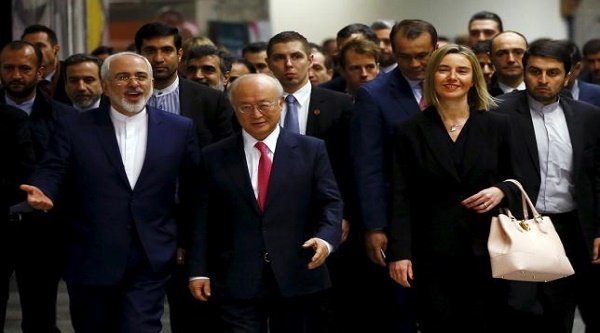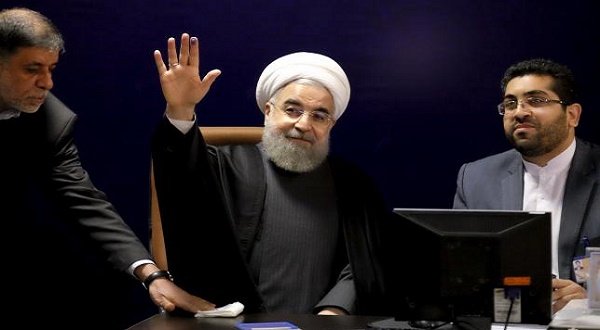
UNITED NATIONS (Reuters) The United Nations Security Council received on Saturday a report by the UN nuclear watchdog confirming Iran fulfilled commitments under a nuclear deal with world powers, triggering an automatic end to most UN sanctions, diplomats said.
The receipt of the International Atomic Energy Agency (IAEA) report by the 15-member council terminates seven previous UN resolutions, which are now replaced by a resolution adopted on July 20 that carries over some UN restrictions.
In a note to council members, seen by Reuters, Uruguay’s UN Ambassador Elbio Rosselli, council president for January, circulated the report to members on Saturday evening.
UN Secretary-General Ban Ki-moon welcomed the implementation of the Iran nuclear deal.
“This achievement demonstrates that international proliferation concerns are best addressed through dialogue and patient diplomacy,” Ban’s spokesman said in a statement.
Under the July 20 resolution, Iran is now “called upon” to refrain from work on ballistic missiles designed to deliver nuclear weapons for up to eight years. Critics of the deal say the language does not make it obligatory.
The resolution allows for supply of ballistic missile technology and heavy weapons, such as tanks and attack helicopters, to Iran with Security Council approval, but the United States has pledged to veto any such requests.
The restrictions on ballistic missile technology are in place for eight years and on heavy weapons for five years. An arms embargo stopping Iran from buying or selling weapons remains in place for up to five years.
The resolution places restrictions on transferring nuclear technology to Iran for peaceful purposes for a decade.
It allows all UN sanctions to be re-imposed if Iran breaches the deal in the next 10 years. If the Security Council receives a complaint of a breach it would then need to vote within 30 days on a resolution to extend sanctions relief.
If the council fails to vote on a resolution, the sanctions would be automatically re-imposed. This procedure prevents any of the veto powers which negotiated the accord, such as Russia and China, from blocking any snap-back of Iran sanctions.
All the provisions and measures of the UN resolution would terminate in a decade if the nuclear deal is adhered to.

Rouhani hails ‘golden page’ in Iran’s history
[dropcap]P[/dropcap]resident Hassan Rouhani hailed on Sunday a nuclear deal with world powers as a “golden page” in Iran’s history, and looked forward to an economic future less dependent on oil as the country emerges from years of sanctions and isolation.
But in an address to parliament he noted bitter opposition to Saturday’s lifting of economic curbs from arch foe Israel, some members of the U.S. Congress and what he called “warmongers” in the region – an apparent reference to some of Iran’s Gulf Arab adversaries.
Iran ended years of economic isolation when world powers lifted the crippling sanctions against the Islamic Republic on Saturday in return for Tehran complying with a deal to curb its nuclear ambitions.
Presenting the draft budget for the next Iranian fiscal year, which begins in March, Rouhani told parliament the deal was a “turning point” for the economy of Iran, a major oil producer which has been virtually shut out of international markets for the past five years.
“The nuclear negotiations which succeeded by the guidance of the Supreme Leader and support of our nation, were truly a golden page in Iran’s history,” he said.
“The nuclear deal is an opportunity that we should use to develop the country, improve the welfare of the nation, and create stability and security in the region,” Rouhani said.
In a dramatic move which coincided with the scrapping of the sanctions, Tehran also announced the release of five Americans including Washington Post reporter Jason Rezaian as part of a prisoner swap with the United States.
Together, the lifting of sanctions and the prisoner deal help to ease the hostility between Tehran and Washington that has shaped the Middle East since Iran’s 1979 Islamic Revolution.
Tens of billions of dollars’ worth of Iranian assets will now be unfrozen and global companies that have been barred from doing business there will be able to exploit a market hungry for everything from automobiles to airplane parts.
CROWNING ACHIEVEMENT FOR ROUHANI
However, America’s thaw with Iran is viewed with deep suspicion by U.S. Republicans as well as allies of Washington in the Middle East, including Israel and Saudi Arabia. U.S.-Iranian suspicion still remains deeply entrenched.
Israel’s opposition was evident in a statement from the office of Prime Minister Benjamin Netanyahu on Saturday night.
“Even after the signing of the nuclear agreement, Iran has not abandoned its aspirations to acquire nuclear weapons, and continues to act to destabilize the Middle East and spread terrorism throughout the world while violating its international commitments,” the statement said.
Rouhani took a swipe at its critics. “Everybody is happy except the Zionists, the warmongers who are fuelling sectarian war among the Islamic nation, and the hardliners in the U.S. congress,” he said.

